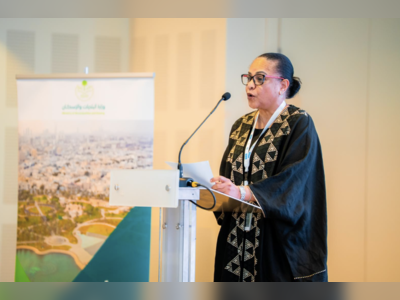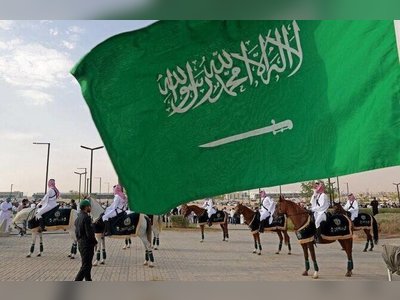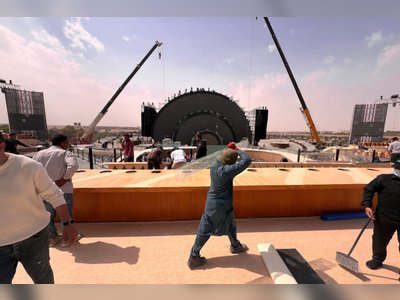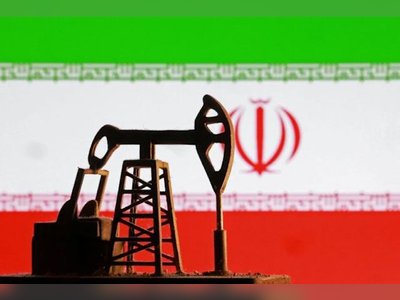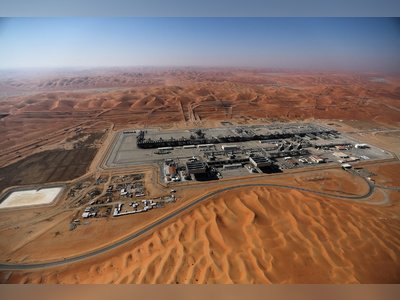
At least 10 protesters were killed in Iraq after followers of Shia cleric stormed palace after he retires
An influential Shiite cleric announced Monday that he would resign from Iraqi politics, prompting hundreds of his angry followers to storm the government palace and sparking clashes with security forces and between rival militias. At least 10 protesters were killed.
Protesters loyal to cleric Muqtada al-Sadr pulled down the cement barriers outside the government palace with ropes and breached the palace gates. Many rushed into the lavish salons and marbled halls of the palace, a key meeting place for Iraqi heads of state and foreign dignitaries.
Iraq’s military announced a nationwide curfew and the caretaker premier suspended Cabinet sessions in response to the violence. Medical officials said at least 15 protesters were wounded by gunfire and a dozen more were injured by tear gas and physical altercations with riot police.
As night fell, a militia loyal to al-Sadr clashed with the Popular Mobilization Forces security inside the heavily fortified Green Zone, the seat of Iraq’s government, wounding at least one woman, according to two security officials.
The crackle of machine gun fire persisted and echoed throughout central Baghdad.
The PMF is an umbrella group composed of state-sanctioned paramilitary groups, the most powerful of which are aligned with al-Sadr’s rivals in the Iran-backed political camp.
Security officials said mortars and rocket-propelled grenades were used in the clashes, a culmination of intractable political impasse between the rival camps.
Iraq’s government has been deadlocked since al-Sadr’s party won the largest share of seats in October parliamentary elections but not enough to secure a majority government. His refusal to negotiate with his Iran-backed Shiite rivals and subsequent exit from the talks has catapulted the country into political uncertainty and volatility amid intensifying intra-Shiite wrangling.
Iraq’s majority Muslim population is split into two sects, Shiites and Sunnis. Under Saddam Hussein, the Shiites were oppressed until the U.S.-led invasion reversed the political order. Now the Shiites are fighting among themselves, with the dispute centering around power and state resources but also influence over the Shiite street.
To further his political interests, al-Sadr has wrapped his rhetoric with a nationalist and reform agenda that resonates powerfully among his broad grassroots base of supporters who hail from Iraq’s poorest sectors of society and have historically been shut out from the political system.
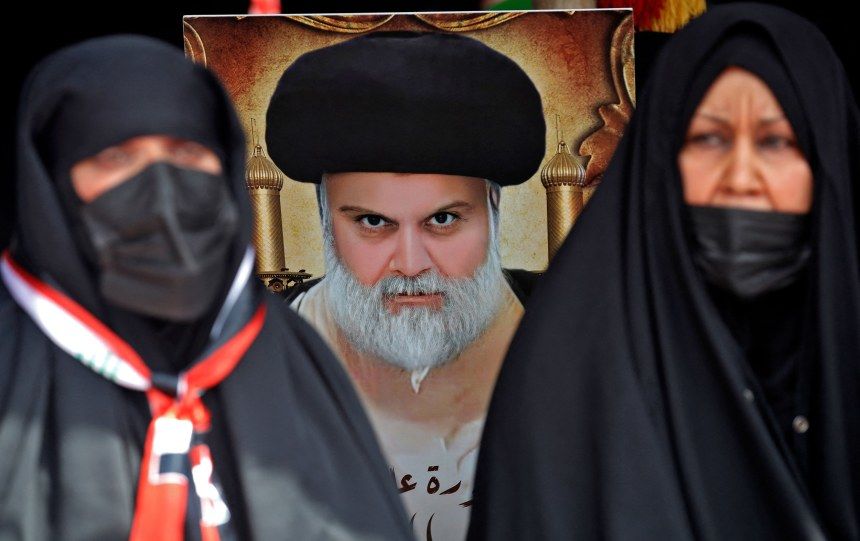 Women supporters stand in front of a
portrait of Iraqi Shia cleric Muqtada al-Sadr during a demonstration
outside Parliament in Baghdad's Green Zone last week.
Women supporters stand in front of a
portrait of Iraqi Shia cleric Muqtada al-Sadr during a demonstration
outside Parliament in Baghdad's Green Zone last week.
Many were first followers of his father, a revered figure in Shiite Islam. They are calling for the dissolution of parliament and early elections without the participation of Iran-backed Shiite groups, which they see as responsible for the status quo.
During Monday’s clashes, Saraya Salam, a militia aligned with al-Sadr gathered in the capital’s Tahrir Square to “protect” protesters, one of its commanders said.
An Associated Press photographer heard gunshots being fired in the capital and saw several protesters bleeding and being carried away. It was not immediately clear who fired the gunshots.
A senior medical official confirmed at least 10 protesters were killed by gunfire. The number was also confirmed by the Sadrist media office, which provided a list of 10 names.
Iraq’s caretaker premier said he would open an investigation into the shootings and said the use of live ammunition against protesters was forbidden.
Protests also broke out in the Shiite-majority southern provinces, with al-Sadr’s supporters burning tires and blocking roads in the oil-rich province of Basra and hundreds demonstrating outside the governorate building in Missan.
Iran considers intra-Shiite disharmony as a threat against its influence in Iraq and has repeatedly attempted to broker dialogue with al-Sadr.
In July, Al-Sadr’s supporters broke into the parliament to deter his rivals in the Coordination Framework, an alliance of mostly Iran-aligned Shiite parties, from forming a government. Hundreds have been staging a sit-in outside the building for over four weeks. His bloc has also resigned from parliament. The Framework is led by al-Sadr’s chief nemesis, former Prime Minister Nouri al-Maliki.
This is not the first time al-Sadr, who has called for early elections and the dissolution of parliament, has announced his retirement from politics — and many dismissed Monday’s move as another bluff to gain greater leverage against his rivals amid a worsening stalemate. The cleric has used the tactic on previous occasions when political developments did not go his way.
But many are concerned that it’s a risky gambit and are worried how it will impact Iraq’s fragile political climate. By stepping out of the political process, al-Sadr is giving his followers, most disenfranchised from the political system, the green light to act as they see fit.
Al-Sadr also commands a militia and maintains a great degree of influence within Iraq’s state institutions through the appointments of key civil servant positions. His Iran-backed rivals also have militia groups.
Iraq’s military swiftly announced a nationwide curfew beginning at 7 p.m. It called on the cleric’s supporters to withdraw immediately from the heavily fortified government zone and to practice self-restraint “to prevent clashes or the spilling of Iraqi blood,” according to a statement.
“The security forces affirm their responsibility to protect government institutions, international missions, public and private properties,” the statement said.
Iraq’s caretaker Prime Minister Mustafa al-Kadhimi also demanded that al-Sadr call on his followers to withdraw from government institutions.
The U.N. mission in Iraq said Monday’s protests were an “extremely dangerous escalation,” and called on demonstrators to vacate all government buildings to allow the caretaker government to continue running the state.
It urged all to remain peaceful and “refrain from acts that could lead to an unstoppable chain of events.”
“The very survival of the state is at stake,” the statement said.
Al-Sadr announced his withdrawal from politics in a tweet, and ordered the closure of his party offices. Religious and cultural institutions will remain open, it said.
The true motivations behind al-Sadr’s announcement appeared to be a reaction to the retirement of Shiite spiritual leader Ayatollah Kadhim al-Haeri, who counts many of al-Sadr’s supporters as followers.
In a surprise announcement Sunday, al-Haeri said he would be stepping down as a religious authority for health reasons and called on his followers to throw their allegiance behind Iran’s Ayatollah Ali Khamenei, rather than the Shiite spiritual center in Iraq’s holy city of Najaf.
The move was a blow to al-Sadr, who despite harboring ambitions to be a religious authority lacks the scholarly credentials to be an ayatollah. Al-Haeri, who resides in the Iranian holy city of Qom, once provided him with the legitimacy he lacked by designating al-Sadr as his representative in Iraq. He cut ties shortly after with the cleric, but continued to enjoy the support of his followers.
By calling on his followers to side with Khamenei, al-Haeri brought on a crisis of legitimacy for al-Sadr.
In his tweet, al-Sadr said al-Haeri’s stepping down “was not out of his own volition.”


